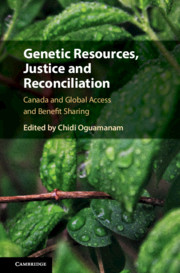Genetic Resources, Justice and Reconciliation
When the oral history of a medicinal plant as a genetic resource is used to develop a blockbuster drug, how is the contribution of Indigenous peoples recognized in research and commercialization? What other ethical, legal and policy issues come into play? Is it accurate for countries to self-identify as users or providers of genetic resources? This edited collection, which focuses on Canada, is the result of research conducted in partnership with Indigenous peoples in that country, where melting permafrost and new sea lanes have opened the region’s biodiversity, underscoring Canada’s status as a user and provider of genetic resources and associated Indigenous knowledge. This work is an important resource for scholars, corporations, Indigenous peoples, policymakers and concerned citizens as Canada and other countries take on the implementation of access and benefit-sharing policies over genetic resources and associated Indigenous knowledge. This title is also available as Open Access on Cambridge Core at http://dx.doi.org/10.1017/9781108557122.
Chidi Oguamanam is a full professor of law at University of Ottawa affiliated with three Centres of Excellence in the University – Law, Technology and Society; Environmental Law and Global Sustainability; Health Law, Policy and Ethics. A dedicated interdisciplinary scholar, Chidi is an internationally renowned expert in the areas of intellectual property, global knowledge governance and their ramifications for Indigenous and Western knowledge productions in diverse contexts such as food and agriculture; biodiversity conservation; culture; entertainment and creativity; medicines and pharmaceuticals; and environmental sustainability as part of the international development law and policy. Named to the Royal Society of Canada College of New Scholars, Artists and Scientists, Chidi is the author of International Law and Indigenous Knowledge: Intellectual Property, Plant Biodiversity, and Traditional Medicine (2006) and Intellectual Property in Global Governance: A Development Question (2011).



